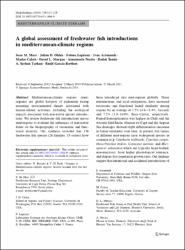A global assessment of freshwater fish introductions in mediterranean-climate regions

Göster/
Tarih
2013Yazar
Marr, Sean M.Olden, Julian D.
Leprieur, Fabien
Arismendi, Ivan
Caleta, Marko
Morgan, David L.
Garcia-Berthou, Emili
Tarkan, Ali Serhan
Üst veri
Tüm öğe kaydını gösterÖzet
Mediterranean-climate regions (med-regions) are global hotspots of endemism facing mounting environmental threats associated with human-related activities, including the ecological impacts associated with non-native species introductions. We review freshwater fish introductions across med-regions to evaluate the influences of non-native fishes on the biogeography of taxonomic and functional diversity. Our synthesis revealed that 136 freshwater fish species (26 families, 13 orders) have been introduced into med-regions globally. These introductions, and local extirpations, have increased taxonomic and functional faunal similarity among regions by an average of 7.5% (4.6-11.4%; Jaccard) and 7.2% (1.4-14.0%; Bray-Curtis), respectively. Faunal homogenisation was highest in Chile and the western Med Basin, whereas sw Cape and the Aegean Sea drainages showed slight differentiation (decrease in faunal similarity) over time. At present, fish faunas of different med-regions have widespread species in common (e.g. Gambusia holbrooki, Cyprinus carpio, Oncorhynchus mykiss, Carassius auratus, and Micropterus salmoides) which are typically large-bodied, non-migratory, have higher physiological tolerance, and display fast population growth rates. Our findings suggest that intentional and accidental introductions of freshwater fish have dissolved dispersal barriers and significantly changed the present-day biogeography of med-regions across the globe. Conservation challenges in med-regions include understanding the ecosystem consequences of non-native species introductions at macro-ecological scales.

















